 Petzlover
Petzlover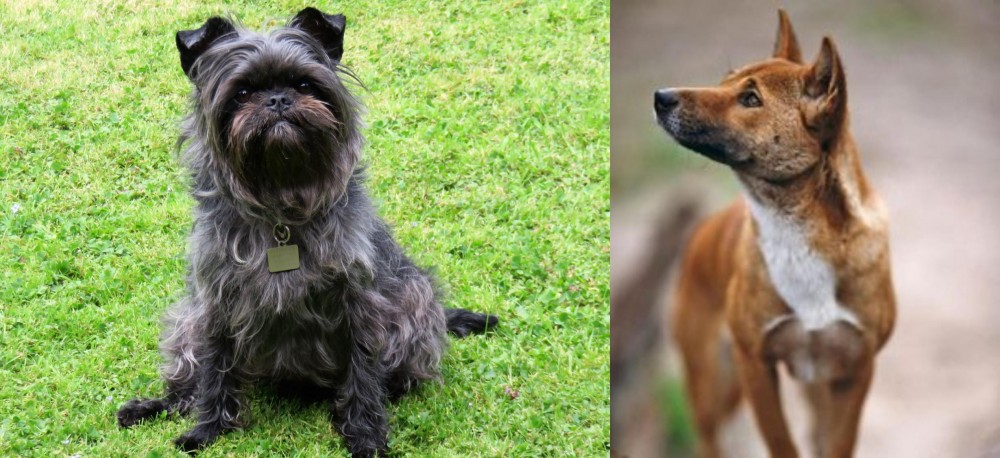 Affenpinscher is originated from Germany but New Guinea Singing Dog is originated from Papua New Guinea. Affenpinscher may grow 8 cm / 3 inches shorter than New Guinea Singing Dog. Affenpinscher may weigh 9 kg / 19 pounds lesser than New Guinea Singing Dog. Affenpinscher may live 7 years less than New Guinea Singing Dog. Affenpinscher may have less litter size than New Guinea Singing Dog. Affenpinscher requires High Maintenance. But New Guinea Singing Dog requires Moderate Maintenance
Affenpinscher is originated from Germany but New Guinea Singing Dog is originated from Papua New Guinea. Affenpinscher may grow 8 cm / 3 inches shorter than New Guinea Singing Dog. Affenpinscher may weigh 9 kg / 19 pounds lesser than New Guinea Singing Dog. Affenpinscher may live 7 years less than New Guinea Singing Dog. Affenpinscher may have less litter size than New Guinea Singing Dog. Affenpinscher requires High Maintenance. But New Guinea Singing Dog requires Moderate Maintenance
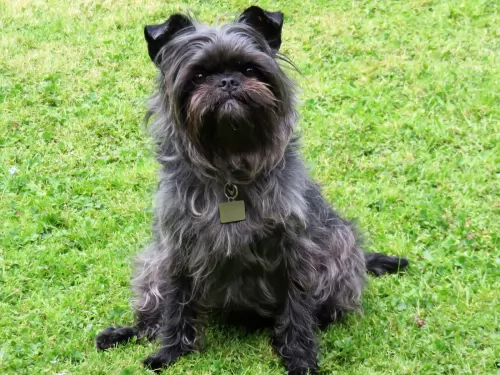 This breed originated from Germany. The latest information on this breed is from the 17th century. Actually, Affenpinscher got its name from Affe, which means monkey. Their accentors considered to be Brussels Griffon and Mini Schnauzer. People trained this breed to be a working dog, to remove rodents, granaries, and stables from the living area.
This breed originated from Germany. The latest information on this breed is from the 17th century. Actually, Affenpinscher got its name from Affe, which means monkey. Their accentors considered to be Brussels Griffon and Mini Schnauzer. People trained this breed to be a working dog, to remove rodents, granaries, and stables from the living area.
 In 1957 the New Guinea Singing Dog was “discovered” in the Highlands of Papua New Guinea and he is found no where else. There is a lot of debate among scientists, taxonomists and biologist as to what is really a species and what is a subspecies. When the NGSD was found he was classified as a new canid species then in 2007 they were downgraded to a subspecies.
In 1957 the New Guinea Singing Dog was “discovered” in the Highlands of Papua New Guinea and he is found no where else. There is a lot of debate among scientists, taxonomists and biologist as to what is really a species and what is a subspecies. When the NGSD was found he was classified as a new canid species then in 2007 they were downgraded to a subspecies.
Today the NGSD is considered to be a wild dog and a primitive dog. They have lived in Papua New Guinea in the Highlands for thousands of years. They are closely related to other wild dogs, such as Australia’s dingo. They are today as they were a thousand years ago – wild. So wild that many counties have them in their zoos.
With the right care and enough socialization, they do very well as companion animals living with people. They are difficult to domesticate however and the person who owns one should be a part of the NGSD community in order to get support, share issues, and learn from others who have lived with these “wild dogs” for many years.
Any New Guinea Singing Dog found in North America or Europe is a direct descendent of two couples that were taken to zoos in China and Australia. The NGSD makes a howling sound that modulates and undulates through a wide series of tones. No other dog makes this musical sound. Rare even in New Guinea today, the Singer is thought to be the rarest of all dogs.
The only organization that recognizes the Singing Dog is the UKC and they are allowed in UKC competition. The NGSD now holds the classification of a domestic dog – a Canis lupus dingo - which is a subspecies of Canis lupus. In 2016 a group of 15 wild dogs were photographed for the first time ever. Prior to this the NGSD were never seen in more than pairs.
It is believed that they do not live and operate in packs, but rather solitary, pairs or family groups where both the parents do the work of raising the pups.
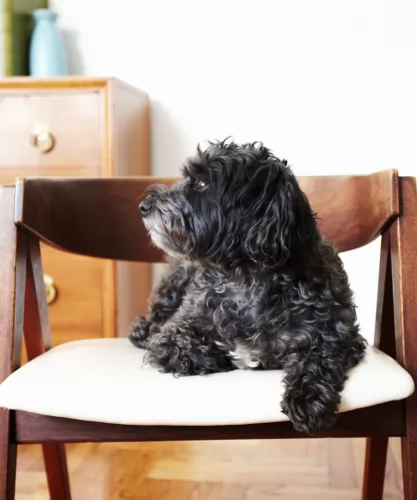 Affenpinscher is a toy size breed and it weights between 2.6 kg to 6 kg. There is no big difference between male and a female dog.
Affenpinscher is a toy size breed and it weights between 2.6 kg to 6 kg. There is no big difference between male and a female dog.
The height of the breed is approximately 23 to 30cm. They have monkey-like expressions, and that is why it got its name. The primary color of the coat is black, but it can be gray, brown, red, white). Every club has a list of acceptable colors. Not all the colors are accepted in every country.
The lifespan of Affenpinscher variates from dog to dog, but it is on average 11.4. That is a typical lifespan of dog that size, but they can live much more depends on the care and health of the dog.
Litter size of Affenpinscher is 1-3 puppies. They are very small dogs, so having a small number of puppies is normal for mini breeds.
Other Names of Affenpinscher are monkey dog, Affen or Affie. All the other names are related to its size and monkey-like look.
 The New Guinea Singing Dog is a medium sized dog with short legs and a broad head. They are about average height and they are very limber and flexible. They can rotate their paws and spread their legs at much greater angles than the average canine. Thus, they can easily climb a tree. They can jump like a cat.
The New Guinea Singing Dog is a medium sized dog with short legs and a broad head. They are about average height and they are very limber and flexible. They can rotate their paws and spread their legs at much greater angles than the average canine. Thus, they can easily climb a tree. They can jump like a cat.
They have very reflective eyes that are shaped like almonds and have dark rims. The color of the eye can be dark brown to dark amber. It is also believed that they can see better than other domestic dogs in low light settings. Their pupils let in more light due to pupils that are wider than most other dogs.
The ears of the NGSD are lined with fur, pointed and erect. The are forward laying and can be rotated in order to hear even the farthest and faintest of sounds. There are dark guard hairs on the spine and back of the ears and tail. On young dogs the muzzle is black but by age 7 it is already beginning to turn gray.
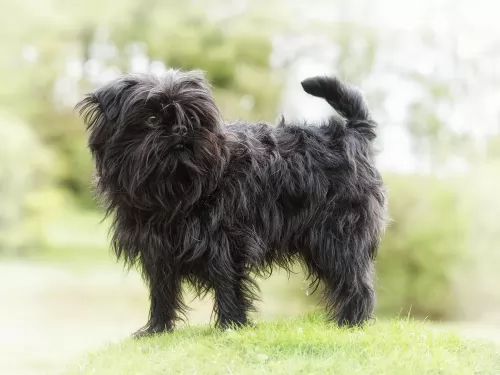 Affenpinscher is a toy sized dog, so they are fragile and you always have to watch out for them. They require a lot of training because they are very stubborn. Breed experts recommend positive training because they can’t respond badly and get depressed if you practice old ways of practice, which include punishments.
Affenpinscher is a toy sized dog, so they are fragile and you always have to watch out for them. They require a lot of training because they are very stubborn. Breed experts recommend positive training because they can’t respond badly and get depressed if you practice old ways of practice, which include punishments.
They tend to bark a lot and can be unfriendly to guests and other animals. It is important to train them properly and to spend as much time as they can with other animals.
The great thing about Affenpinscher is that they are very easy to carry around and they are beautiful little dogs. They are braver than most of the toy dogs because of the terrier descent. The funny thing about them is that they take themselves very seriously which can be very funny to the owners.
They don’t need a lot of exercises. They love walking, but they do not require a lot of it.
Affenpinscher is a great watch dog. They tend to protect the house and they are amazing dogs for watching.
They are not very good with children because they are very sensitive and they love attention. It is also important not to spoil them, even if it’s funny sometimes, it is not recommended to spoil your dog.
 They could be, but it must be remembered that this is a wild dog.
They could be, but it must be remembered that this is a wild dog.
Varying the pitches when howling
It’s possible but not recommended. Leave them wild.
Highly intelligent but trainability is questionable unless well socialize and attached to their people.
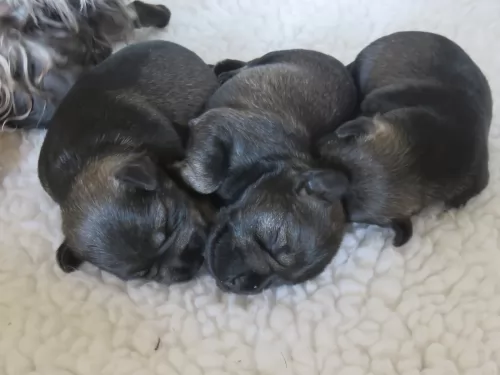 It is very important to choose a quality puppy from a quality breed. Affenpinscher can have some health problems. Hip dysplasia collapsed trachea, and the luxating patella is the most common health complications of this breed. But, the most of the dogs die of an old age, so if you are choosing wisely, and with proper education and consulting, you will have a happy and a healthy dog.
It is very important to choose a quality puppy from a quality breed. Affenpinscher can have some health problems. Hip dysplasia collapsed trachea, and the luxating patella is the most common health complications of this breed. But, the most of the dogs die of an old age, so if you are choosing wisely, and with proper education and consulting, you will have a happy and a healthy dog.
 Though the breed is not extinct – it is so wild and secretive that there is no history or record of any health problems. However, the small number of domestic companion animals have shown health issues in recent years.
Though the breed is not extinct – it is so wild and secretive that there is no history or record of any health problems. However, the small number of domestic companion animals have shown health issues in recent years.
Pancreatitis – can be chronic or acute. If chronic it needs to be treated and diet changed. If acute it is usually deadly.
Hip Dysplasia – can cause lameness or arthritis.
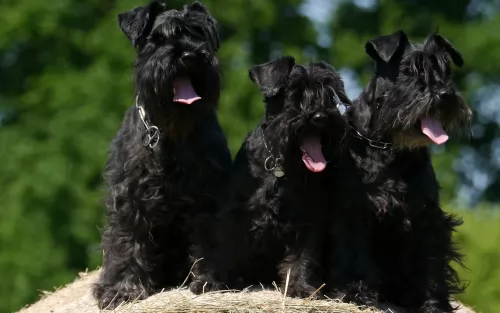 Affenpinscher daily amount food should be based on a size and activity of the dog. But approximately ¼ or ½ cup of high-quality food should be enough for your dog. It is recommended to divide into two meals per day. You can also add some vegetables, oil, meat or fruits into a meal, but only small size portions.
Affenpinscher daily amount food should be based on a size and activity of the dog. But approximately ¼ or ½ cup of high-quality food should be enough for your dog. It is recommended to divide into two meals per day. You can also add some vegetables, oil, meat or fruits into a meal, but only small size portions.
Feeding Affenpinscher puppy is similar to feeding an adult dog. The difference is in a number of meals per day. It is recommended to give 3-5 portions per day for a puppy.
Also giving vitamins and minerals to a puppy dog is very important for health.
Grooming the Affenpinscher could be a challenging task. It requires regular care with every day brushing and cleaning. They have a strong and rough coat. A good side of that is Affen size. They are not big, so there wouldn’t be a lot to groom.
 In the wild both pups and adults are thought to eat small mammals and birds as well as fruits. In homes feed a high protein diet. Because of the tendency toward pancreatitis do not feed raw or under cooked meat. If feeding meet do so in small amounts well cooked, very lean. Stay away from the fat. Feed puppies very small amounts. ¾-1 cup high quality dry puppy food twice a day.
In the wild both pups and adults are thought to eat small mammals and birds as well as fruits. In homes feed a high protein diet. Because of the tendency toward pancreatitis do not feed raw or under cooked meat. If feeding meet do so in small amounts well cooked, very lean. Stay away from the fat. Feed puppies very small amounts. ¾-1 cup high quality dry puppy food twice a day.
Same as the puppy when it comes to meat although you could give the adult a little more. 1 ½ cups od high quality medium breed dog food twice a day.
In the wild there is no indication of health issue. A very healthy breed.
The NGSD needs a lot of stimulation both mental and physical. They must have a daily walk and somewhere to run. They are escape artist in homes. Remember they can jump like cats and climb trees. If their head can pass through a hole, so can the rest of their body.